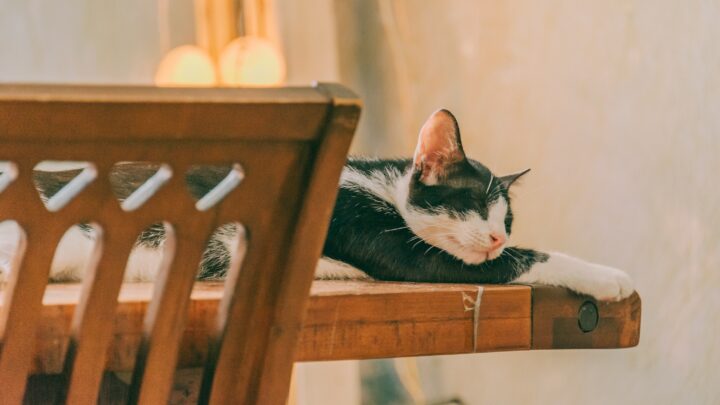Poultry is one of the most popular meats on the market, and bacon is a godsend for many people. As cat owners (especially meat-loving ones!) we naturally want to spoil our furkids. So, it’s no wonder you’re thinking Can cats eat turkey bacon?
Turkey is a popular meat in many countries as it’s cheaper than beef, for example. It’s also a healthy source of protein, fat, and other nutrients.
Felines are obligate carnivores which means they need to eat meat. This means that while you can go vegetarian or vegan, your pet really can’t.
You can survive on plant-based protein meals, such as tofu. Things are a little different when it comes to cats, though.
Their bodies are designed to process animal-derived protein and while plants can be an addition to their diet, they can in no way replace meat. Just as water makes a garden thrive, cats need a meat diet to help them grow.
Without meat, the possibility of your pet getting sick is high. However, fresh and cooked meat is one thing, while processed treats are another. Does this mean cats can eat turkey bacon or should they stay away from it?
Can cats eat turkey bacon?
There is no short answer really. It’s both yes and no because it depends on a lot of things. Does your cat like turkey bacon? How much do you give her and how often? Is it homemade or store-purchased?
There are a number of questions you need to ask yourself when introducing new foods into your feline’s diet. Don’t worry about being fussy, it’s the right thing to do! As a cat parent, you’re responsible for your furkid’s health and obliged to provide her with the best care possible.
This is the part where all the questions about food come! We all have a soft spot for those begging eyes, but just how much should we be giving in? Sometimes when she begs for your food, you need to know where to draw the line.
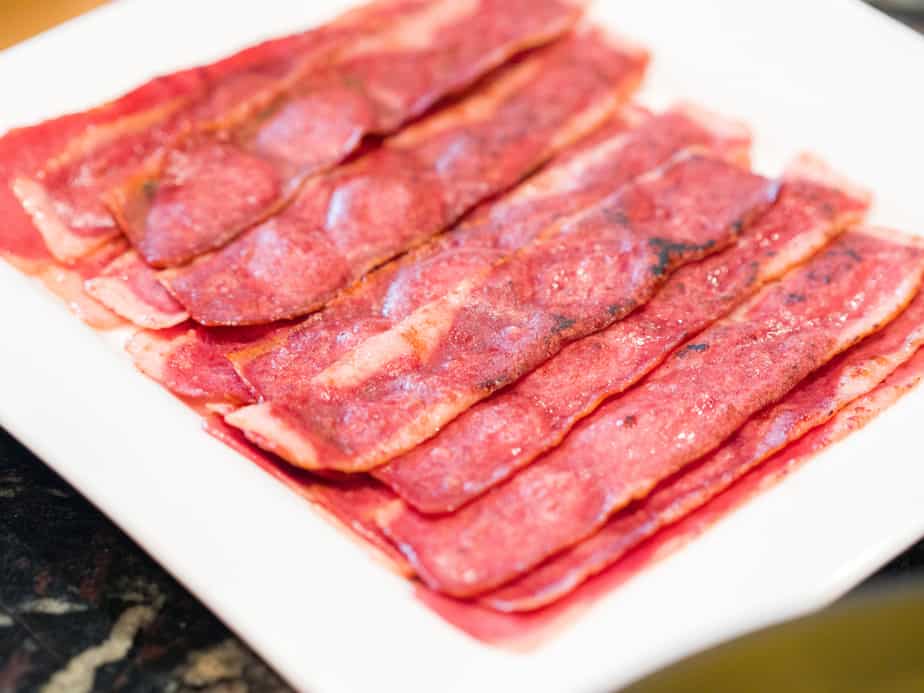
What is turkey bacon made of?
Turkey bacon has nothing to do with the turkey, however. Although it’s meat, it doesn’t necessarily make it a healthy choice for your pet. Yes, cats can eat turkey bacon occasionally, but what does this mean?
Your cat will probably try to persuade you that she’s the most suitable one for making these kinds of decisions. However, don’t let those big doe eyes and soft meow fool you!
We know that tiny paw clawing at you is hard to resist, but keep in mind that there’s more to turkey bacon than meets the eye! It looks and tastes delicious, so what could go wrong?
Besides meat, there are a number of other ingredients added in the making of this delicious meat treat. Find out if cats can eat turkey bacon because of them!
1. Meat, of course!
Say yes to the meat! As we previously stated, your cat is a meat-lover. She depends on meat intake to fulfill all of her dietary needs. Animal protein provides felines with much-needed energy and benefits their overall health.
It boosts their immune systems and helps their growth. When a cat isn’t getting enough protein in her diet, things go downhill. She’ll start losing weight, which is followed by muscle loss. Weakness, fatigue, as well as other signs, usually follow.
Cats will fall ill rapidly as protein is an essential nutrient. Daily requirements of protein need to be met with cat-appropriate foods. Turkey is an excellent choice of protein, vitamins, minerals, and healthy fats.
Unfortunately, turkey bacon is a highly processed meat where it has insufficient amounts of nutrients. The long process makes the meat richer in flavor, but poor in nutritional value. Therefore, while small amounts can serve as an occasional treat, large quantities aren’t recommendable.
2. Sodium content
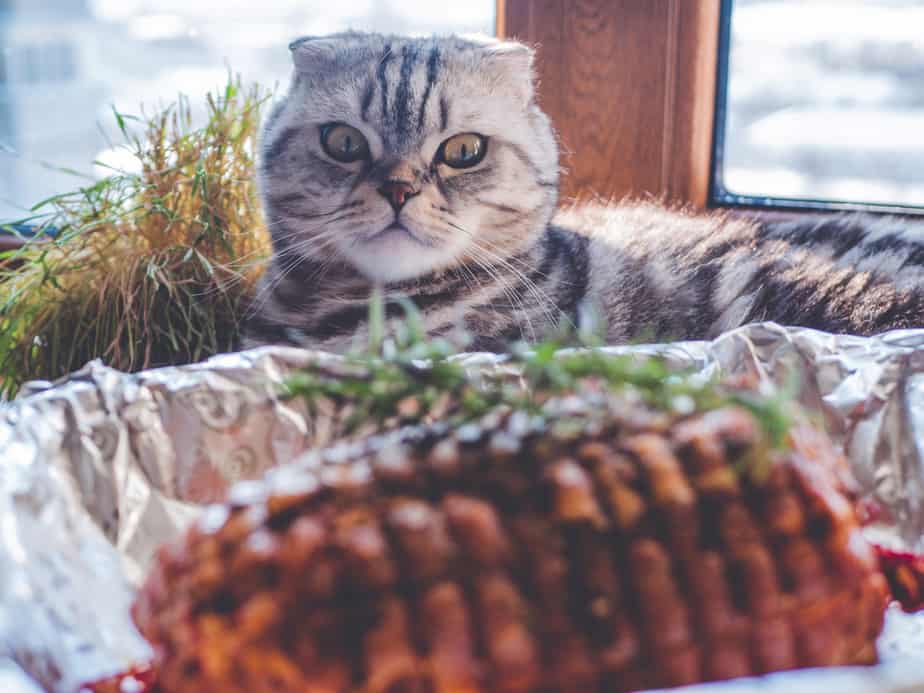
Another issue with turkey bacon is the excessive amount of salt, which is used not only for flavor, but as a preservative. Sodium is an important mineral that’s crucial for keeping fluids balanced.
However, overconsumption of this mineral can lead to adverse effects in cats. One of the possible side effects is salt poisoning.
This occurs when your feline eats too much salt that she can’t digest. Although unlikely, nothing is impossible. Especially when a large portion of salt is used, which will induce vomiting in felines.
Sodium toxicity can damage your cat’s health and provoke certain symptoms. These include vomiting, diarrhea, as well as seizures, tremors, and coma. Apart from the obvious distress that your cat will undergo, it’ll also rack up vet bills.
Unfortunately, turkey bacon is packed with salt and therefore not an ideal addition to your furkid’s diet.
3. Preservatives
These are often used in store-bought, commercial foods like turkey bacon, or beef jerky. They serve the purpose of prolonging the shelf-life of the product. Preservatives are used for preserving the taste, color, and freshness of foods.
This sounds great, but your cat’s body isn’t designed to process these ingredients. Although preservatives aren’t the cause of immediate concern, when your cat is exposed to these compounds for a longer period of time, she may start being affected by them.
Can cats eat raw turkey bacon?
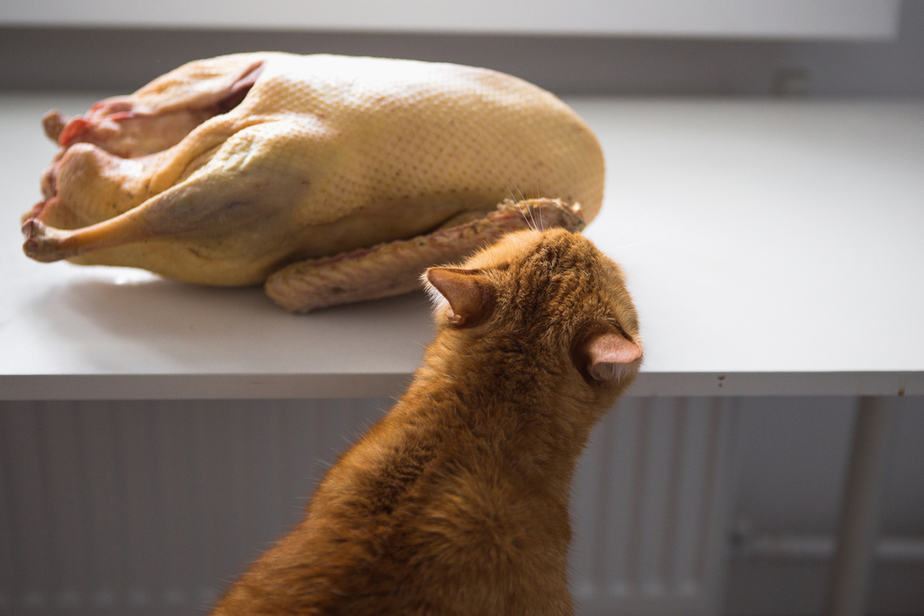
Sure they can, although it isn’t advisable. Raw meat can be a disease carrier.
Uncooked meat is likely to be tainted with certain diseases and bacteria, such as E. coli and salmonella. A small bite of raw bacon isn’t likely to cause immediate harm, but be on the lookout for any odd behaviors.
Moreover, raw meat is harder to chew on. We know what you’re thinking, how can cats then eat raw meat in the wild? Years of domestication have made our four-legged companions different and very reliant on us.
They’re less equipped than their wild cousins, but that doesn’t mean they’re less worthy. They don’t have big claws and teeth like them, but thankfully, they don’t need them.
Because of this, raw meat can be hard to chew and digest for our domestic furriends. If you have a cat that likes to wolf down food, turkey bacon may be a choking hazard.
To avoid these possible case scenarios, make sure food is chopped up in tiny, bite-sized pieces. That way, your pet won’t have to struggle with tough chunks and you won’t have to worry sick about it.
Why is turkey bacon bad for cats?
Unfortunately, cats eating turkey bacon can do more harm than good. Although it contains certain health benefits, the cons outweigh the pros. Insufficient health nutrients mean low nutritional value, which isn’t great news.
Fat, just like protein, is essential to cats. This nutrient provides your furry friend with a much-needed energy source. Although scarce, the healthy fats found in turkey bacon help keep your cat warm.
That said, turkey bacon is unfortunately packed with saturated fats that are highly unhealthy. These are known to raise cholesterol levels in the blood, which have been linked to various heart diseases and strokes. Now, we don’t want that for our furbabies, right?
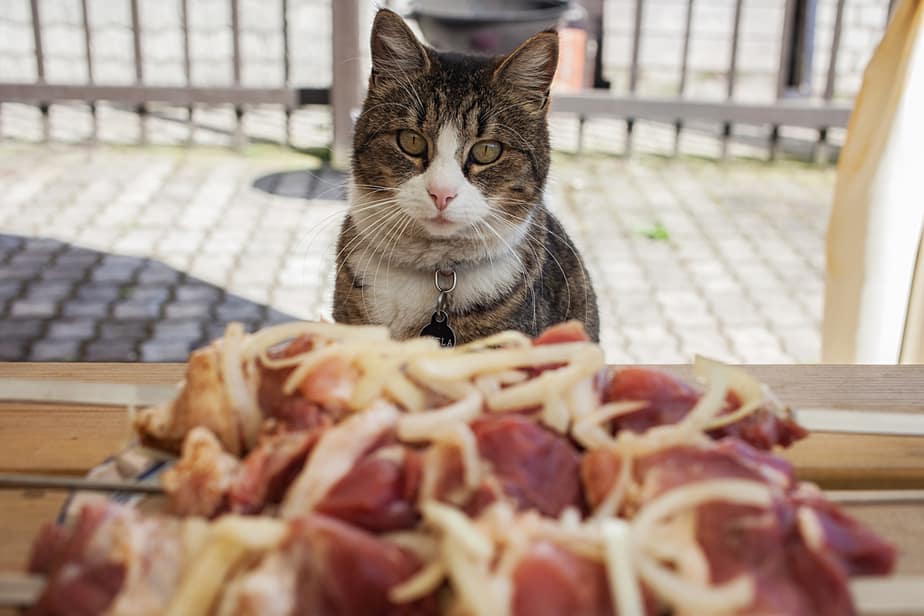
To sum up
An occasional snack of some delicious turkey bacon isn’t likely to harm your cat, but beware of the salt content. Also, your pet may go crazy for it, so that’s another thing to worry about. Once they set their mind on something, it’s hard to discourage them.
“Can cats eat turkey bacon? Surely they can because it has protein?” If this has come to your mind, you’re right. Turkey, as well as chicken wings, are amazing sources of protein. However, they’re also packed with saturated fats that are unhealthy for your pet.
With human foods like this, you always have to outweigh the pros and cons they bring. So, cats can technically eat turkey bacon, but in very limited amounts and only as a treat.

